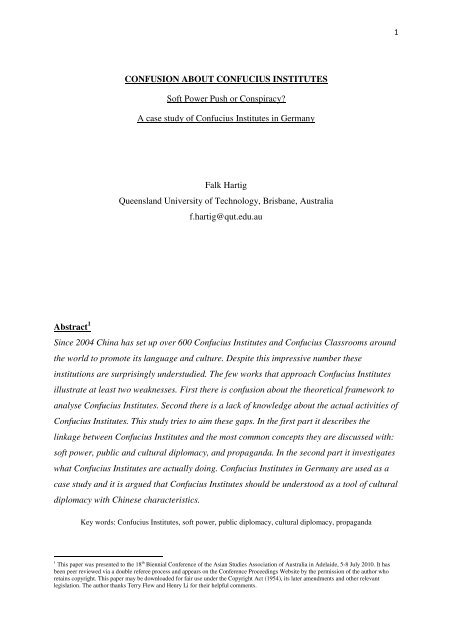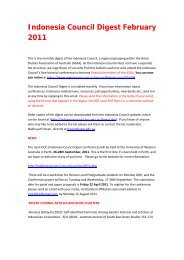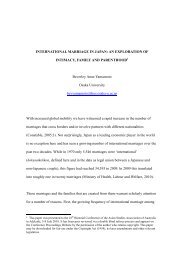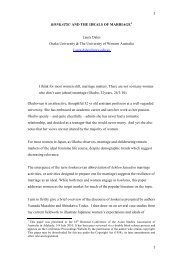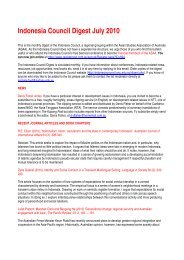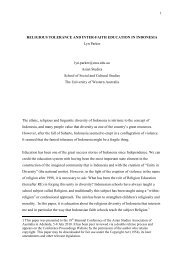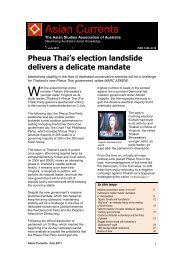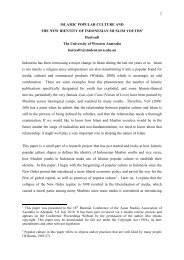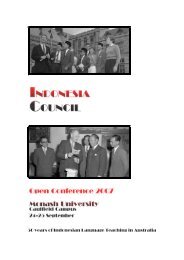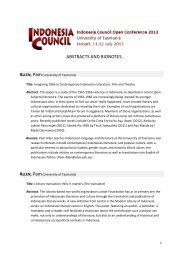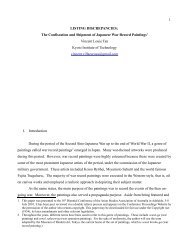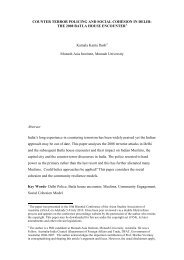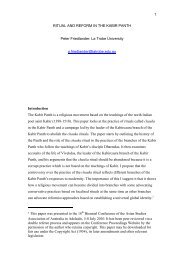CONFUSION ABOUT CONFUCIUS INSTITUTES Soft Power Push or ...
CONFUSION ABOUT CONFUCIUS INSTITUTES Soft Power Push or ...
CONFUSION ABOUT CONFUCIUS INSTITUTES Soft Power Push or ...
You also want an ePaper? Increase the reach of your titles
YUMPU automatically turns print PDFs into web optimized ePapers that Google loves.
Abstract 1<br />
<strong>CONFUSION</strong> <strong>ABOUT</strong> <strong>CONFUCIUS</strong> <strong>INSTITUTES</strong><br />
<strong>Soft</strong> <strong>Power</strong> <strong>Push</strong> <strong>or</strong> Conspiracy?<br />
A case study of Confucius Institutes in Germany<br />
Falk Hartig<br />
Queensland University of Technology, Brisbane, Australia<br />
f.hartig@qut.edu.au<br />
Since 2004 China has set up over 600 Confucius Institutes and Confucius Classrooms around<br />
the w<strong>or</strong>ld to promote its language and culture. Despite this impressive number these<br />
institutions are surprisingly understudied. The few w<strong>or</strong>ks that approach Confucius Institutes<br />
illustrate at least two weaknesses. First there is confusion about the the<strong>or</strong>etical framew<strong>or</strong>k to<br />
analyse Confucius Institutes. Second there is a lack of knowledge about the actual activities of<br />
Confucius Institutes. This study tries to aim these gaps. In the first part it describes the<br />
linkage between Confucius Institutes and the most common concepts they are discussed with:<br />
soft power, public and cultural diplomacy, and propaganda. In the second part it investigates<br />
what Confucius Institutes are actually doing. Confucius Institutes in Germany are used as a<br />
case study and it is argued that Confucius Institutes should be understood as a tool of cultural<br />
diplomacy with Chinese characteristics.<br />
Key w<strong>or</strong>ds: Confucius Institutes, soft power, public diplomacy, cultural diplomacy, propaganda<br />
1 This paper was presented to the 18 th Biennial Conference of the Asian Studies Association of Australia in Adelaide, 5-8 July 2010. It has<br />
been peer reviewed via a double referee process and appears on the Conference Proceedings Website by the permission of the auth<strong>or</strong> who<br />
retains copyright. This paper may be downloaded f<strong>or</strong> fair use under the Copyright Act (1954), its later amendments and other relevant<br />
legislation. The auth<strong>or</strong> thanks Terry Flew and Henry Li f<strong>or</strong> their helpful comments.<br />
1
Introduction<br />
Ever since the first Confucius Institute (CI) was established in 2004 there have been<br />
obscurities what Confucius Institutes actually are, and what the goals and purposes of these<br />
institutes are. On the one hand it is argued “the institutes could increase China’s ‘soft power’”<br />
(Paradise 2009: 647); they are seen as instruments of Chinese public diplomacy (d’Hooghe<br />
2007, Rawnsley 2009) <strong>or</strong> cultural diplomacy (Wang/Lu 2008, Cull 2009). On the other hand<br />
critiques perceive Confucius Institutes as propaganda tools (Fan 2008, Steffenhagen 2008).<br />
Besides these the<strong>or</strong>etical ambiguities another aspect is striking. Hans Hendrischke, direct<strong>or</strong> of<br />
the Confucius Institutes at the University of Sydney, notes c<strong>or</strong>rectly that only “little of this<br />
literature [on Confucius Institutes] is based on actual evidence of activities of Confucius<br />
Institutes” (Sharp 2010:2).<br />
Theref<strong>or</strong>e this paper pursues two goals. First it aims to untangle the confusion regarding the<br />
different the<strong>or</strong>etical approaches by presenting the concepts of soft power, public and cultural<br />
diplomacy and propaganda in relation to Confucius Institutes. Second it will examine the<br />
actual activities of the institutes. The study uses Confucius Institutes in Germany as a case<br />
study and argues that Confucius Institutes should be understood as a tool of cultural<br />
diplomacy with Chinese characteristics.<br />
After introducing Confucius Institutes the paper outlines the the<strong>or</strong>etical framew<strong>or</strong>k to provide<br />
an instrument f<strong>or</strong> further analysis. The paper then turns to the case study. F<strong>or</strong> that semi-<br />
structured interviews with direct<strong>or</strong>s and general managers of eight German Confucius<br />
Institutes were conducted between October and December 2009. Furtherm<strong>or</strong>e program<br />
guides 2 and annual w<strong>or</strong>king rep<strong>or</strong>ts (CIHQ 2008, 2009) of German Confucius Institutes were<br />
evaluated.<br />
About Confucius Institutes<br />
Until mid of 2010 “316 Confucius Institutes and 337 Confucius Classrooms [were]<br />
established in 94 countries and regions w<strong>or</strong>ldwide (Xinhua 2010)”. 3 Confucius Institutes are<br />
“non-profit educational <strong>or</strong>ganizations promoting the teaching of Chinese language outside<br />
2 Most programs are available online, some were provided by the interviewees.<br />
3 The main difference between Confucius Institutes and Confucius Classrooms affects the <strong>or</strong>ganizational structure. There is no clear cut<br />
distinction between both models but it seems the main difference is whether the local partner is a university <strong>or</strong> any other cultural <strong>or</strong><br />
educational entity. To simplify matters, only the term ‘Confucius Institute’ is used.<br />
2
China, training language instruct<strong>or</strong>s and strengthening cultural exchange and cooperation<br />
between China and other countries” (Tang 2010).<br />
All Confucius Institutes are under the auth<strong>or</strong>ity of Hanban, the Office of Chinese Language<br />
Council International. Hanban is composed of representatives from 12 ministries and<br />
commissions within the Chinese central government (Ren 2010:1), while the Ministry of<br />
Education carries the main responsibility. Hanban is in charge of placing teachers, the<br />
development and distribution of teaching materials, and it co<strong>or</strong>dinates the cooperation<br />
between the partner institutions in China and abroad which run Confucius Institutes.<br />
M<strong>or</strong>e often than not Confucius Institutes are mistakenly understood as the “Chinese version of<br />
Spain's Instituto Cervantes, Germany's Goethe-Institute, the British Council and Alliance<br />
Francaise” (Li 2008). A closer analysis reveals that this is only partly c<strong>or</strong>rect. One imp<strong>or</strong>tant<br />
difference between Confucius Institutes and their western counterparts is their <strong>or</strong>ganizational<br />
f<strong>or</strong>m. There are three operation modes f<strong>or</strong> Confucius Institutes: Wholly operated by China,<br />
with local partners as joint ventures, and “wholly locally run offices licensed by […] Beijing”<br />
(Starr 2009:70). The most common f<strong>or</strong>m is the joint venture structure, as it is practiced in<br />
Europe, Australia <strong>or</strong> N<strong>or</strong>th America. These joint ventures are cooperation projects between<br />
Chinese and international partners. N<strong>or</strong>mally the Chinese offer teaching materials and send<br />
language teachers, while local partners provide space, facilities and local staff.<br />
Furtherm<strong>or</strong>e Hanban supp<strong>or</strong>ts Confucius Institutes with an annual budget. By the end of 2007<br />
the Chinese government had spent 26 million US Dollar on Confucius Institutes w<strong>or</strong>ldwide<br />
(Liu 2008: 31). In her w<strong>or</strong>k rep<strong>or</strong>t f<strong>or</strong> 2009 Xu Lin, Chief executive of the Confucius Institute<br />
Headquarters, stated that “funding f<strong>or</strong> the Confucius Institutes contributed from both China<br />
and abroad [...] has increased to 119,000,000 U.S. dollars in total, showing a 50-50 percent<br />
share from both sides. This is over 400,000 U.S. dollars on average f<strong>or</strong> each Confucius<br />
Institute” (Xu 2010:18).<br />
Theref<strong>or</strong>e it can be argued that the Chinese approach is strategic as it is efficient. By utilizing<br />
the current global fascination with Chinese language and culture, the Chinese government has<br />
found willing international partners to co-finance the Confucius Institutes and thus partially<br />
fund China’s “charm offensive” (Kurlantzick 2007). Acc<strong>or</strong>ding to Xu Lin this cooperative<br />
3
model guarantees that Confucius Institutes are an instrument that helps the Chinese<br />
government to obtain huge effects with the least amount of money (quoted in Liu 2008:33).<br />
The perception of Confucius Institutes<br />
The financial and <strong>or</strong>ganizational linkage with the Chinese government leads to the assumption<br />
that Confucius Institutes “are propaganda tools” (Fan 2008:3) <strong>or</strong> one of “China’s f<strong>or</strong>eign<br />
propagandists” (Brady 2008: 159). The Canadian Security Intelligence Service came to the<br />
result that China uses Confucius Institutes “in its drive f<strong>or</strong> global dominance” (The Canadian<br />
Press 2007) and in various host Cities, there are “deeply divided views about Confucius<br />
Institute[s]: some say it’s a goodwill gesture by Beijing to teach Chinese language and culture,<br />
while others believe it’s part of a plot by an emerging superpower to infiltrate and influence<br />
f<strong>or</strong>eign citizens and their government” (Steffenhangen 2008). Jocelyn Chey, a f<strong>or</strong>mer<br />
Australian Consul-General in Hong Kong, summarizes the opinions of most critics by saying<br />
“because of the Institutes’ close links with the Chinese government and Party [the w<strong>or</strong>k of<br />
these institutes], at best, would result in dumbing down of research and, at w<strong>or</strong>st, could<br />
produce propaganda” (Chey 2008: 44).<br />
In contrast, scholars put Confucius Institutes in the context of soft power (Gil 2009, Rui 2010).<br />
Paradise sees chances that Confucius Institutes “could increase China’s ‘soft power’”<br />
(Paradise 2009: 647). F<strong>or</strong> d’Hooghe Confucius Institutes are an “instrument of” and “China’s<br />
latest addition to public diplomacy” (d’Hooghe 2007: 29). Acc<strong>or</strong>ding to Rawnsley, China’s<br />
approach to public diplomacy has focused on the economy and culture and “the cultural<br />
approach is centered within the new Confucius Institutes” (Rawnsley 2009: 285). Cull<br />
describes Confucius Institutes as the “central project of Chinese cultural diplomacy” (Cull<br />
2009: 12).<br />
The practical value of Confucius Institutes is discussed in Chinese academic journals.<br />
Acc<strong>or</strong>ding to Liu the establishment of Confucius Institutes is not just to internationalize<br />
education, but furtherm<strong>or</strong>e Confucius Institutes are a special representation of China’s soft<br />
power which in turn is an imp<strong>or</strong>tant contribution to enf<strong>or</strong>ce the good image of China (Liu<br />
2007:51). Li sees the main purpose of Confucius Institutes in helping China to do business<br />
and to open markets (Li 2008:46/47). Duan Yi, a f<strong>or</strong>mer Hanban employee, explains that<br />
Confucius Institutes are an effective mechanism f<strong>or</strong> the scientific contribution to economic<br />
globalization (Duan 2008:51). Confucius Institute can provide competitive advantages f<strong>or</strong><br />
4
China’s economy and trade by providing language and cultural consultation. The Confucius<br />
Institute in Poitiers, France, is teaching Chinese to French w<strong>or</strong>kers at ZTE, a Chinese<br />
communications company. And a Confucius Institute in Thailand, with its partner Southwest<br />
University Chongqing, is helping the company Chongqing Mot<strong>or</strong>bike to enter the Thai market<br />
(Duan 2008:51).<br />
The<strong>or</strong>etical framew<strong>or</strong>k: soft power, public and diplomacy, propaganda<br />
<strong>Soft</strong> <strong>Power</strong> as defined by Joseph Nye “is the ability to get what you want trough attraction<br />
rather than coercion <strong>or</strong> payments” and it arises from “the attractiveness of a country’s culture,<br />
political ideas, and policies” (Nye 2004: x). Leaving the discussion about the sh<strong>or</strong>tcomings of<br />
this concept aside 4 , it is obvious that there has to be “an instrument that governments use to<br />
mobilize these resources to communicate with and attract the publics of other countries” (Nye<br />
2008: 95).<br />
This instrument, which helps to wield soft power, is public diplomacy. Acc<strong>or</strong>ding to one<br />
definition public diplomacy means “an international act<strong>or</strong>’s attempt to advance the ends of<br />
policy by engaging with f<strong>or</strong>eign publics” (Cowan/Cull 2008:6) and its practice can be divided<br />
into five elements: “listing, advocacy, cultural diplomacy, exchange diplomacy, and<br />
international broadcasting” (Cull 2008:33). Cultural diplomacy in turn is “an act<strong>or</strong>’s attempt<br />
to manage the international environment by making its cultural resources and achievements<br />
known overseas and/<strong>or</strong> facilitating cultural transmission abroad” (ibid.).<br />
The fact that public diplomacy (and cultural diplomacy) is initiated by governments leads to<br />
the accusation of propaganda. As Richard Holbrook noted: “Call it public diplomacy, <strong>or</strong><br />
public affairs, <strong>or</strong> psychological warfare, <strong>or</strong> – if you really want to be blunt – propaganda”<br />
(Holbrooke 2001:B07). Governments aim to distinguish both concepts and argue that public<br />
diplomacy deals with “the known facts”, while propaganda is based on a mixture of facts and<br />
untruths (Wolf/Rosen 2004:3). F<strong>or</strong> Nye “good public diplomacy has to go beyond propaganda”<br />
(Nye 2008:101), because “inf<strong>or</strong>mation that appears to be propaganda […] may turn out to be<br />
counterproductive if it undermines a country’s reputation f<strong>or</strong> credibility” (Nye 2008:100).<br />
Propaganda “in the most neutral sense means to disseminate <strong>or</strong> promote particular ideas”<br />
(Jowett/O’Donnell 2006:2) and it is wrong that “propaganda is always harmful, always false”<br />
(Hummel/Huntress 1949/1967:2). Nevertheless in general propaganda has a “highly negative”<br />
4 See f<strong>or</strong> example Hall (2010).<br />
5
connotation (Walton 1997: 383) and “many people mistakenly consider it a synonym f<strong>or</strong><br />
falsehood <strong>or</strong> lie” (F<strong>or</strong>d 1967:vii). But “it is only since the advent of Adolph Hitler that this<br />
w<strong>or</strong>d has acquired universally its sinister connotation” (ibid.). Jowett/O’Donnell also state the<br />
negative and dishonest connotation and list w<strong>or</strong>ds “frequently used as synonyms f<strong>or</strong><br />
propaganda [such as] lies, dist<strong>or</strong>tion, deceit, manipulation, mind control, psychological<br />
warfare, brainwashing, and palaver” (Jowett/O’Donnell 2006: 2-3). F<strong>or</strong> them “propaganda is<br />
the deliberate, systematic attempt to shape perceptions, manipulate cognitions, and direct<br />
behavi<strong>or</strong> to achieve a response that furthers the desired intent of the propagandist”<br />
(Jowett/O’Donnell 2006: 7).<br />
Bef<strong>or</strong>e turning to the case study, it is helpful to summarize these the<strong>or</strong>etical approaches in<br />
relation to Confucius Institutes. It should become clear, that it is somewhat misleading to<br />
describe these institutes as “instruments of China’s soft power” (Ren 2010:2). Based on the<br />
above definitions it appears m<strong>or</strong>e accurate to understand Confucius Institutes as an instrument<br />
of cultural diplomacy with the aim to wield China’s soft power. Taking into account the<br />
described proximity between public diplomacy/cultural diplomacy and propaganda, the<br />
question arises whether Confucius Institutes are an instrument of cultural diplomacy <strong>or</strong> tools<br />
of propaganda f<strong>or</strong> the Chinese government.<br />
Case study: Confucius Institutes in Germany<br />
To answer this question, the second part of the paper uses Confucius Institutes in Germany as<br />
a case study to describe the institutes and their activities. First the general set-up f<strong>or</strong> German<br />
Confucius Institutes is outlined, followed by a rating of their actual activities. This analysis<br />
will help to get a better understanding of whether Confucius Institutes are telling lies and<br />
manipulate cognition and theref<strong>or</strong>e fit into the approach of propaganda; <strong>or</strong> whether they are<br />
an attempt to manage the international environment by making China’s cultural resources and<br />
achievements known overseas and thus fit into the cultural diplomacy approach.<br />
Facts and figures about Confucius Institutes in Germany<br />
The first Confucius Institute in Germany was established in 2006 at Free University of Berlin.<br />
Currently there are eleven Confucius Institutes and one Confucius Classroom 5 , all <strong>or</strong>ganized<br />
as joint venture. Most of the German host institutions are universities, expect a private<br />
foundation in Munich and a local friendship association in Hannover. Besides the University<br />
5 Confucius Institutes exist in Berlin, Nuernberg-Erlangen, Leipzig, Trier, Hamburg, Hannover, Duisburg, Dusseld<strong>or</strong>f, Heidelberg, Frankfurt<br />
and Freiburg. Munich is hosting the only German Confucius Classroom.<br />
6
in Dusseld<strong>or</strong>f, every university hosting a Confucius Institute has its own department of<br />
Sinology <strong>or</strong> Chinese studies. These departments usually w<strong>or</strong>ked closely with Chinese<br />
universities f<strong>or</strong> a long time and generally this cooperation was the basis f<strong>or</strong> the establishment<br />
of the Confucius Institute (I3, I6).<br />
The average annual subsidy paid by Hanban is about 100.000 US Dollar f<strong>or</strong> German<br />
Confucius Institutes. Beyond that institutes can apply f<strong>or</strong> additional funding related to specific<br />
projects (I3, I4). When the first German institutes were established in 2006/2007 Hanban only<br />
concluded contracts f<strong>or</strong> three years, which led to some insecurities regarding the financial<br />
supp<strong>or</strong>t after this time (Hartig 2007: 69). But currently it seems the financial situation relaxed<br />
to some degree and one managing direct<strong>or</strong> assumes that funding is safe at least until 2020<br />
(Weigl 2009: 35).<br />
What is happening at Confucius Institutes<br />
Confucius Institutes address, usually but not exclusively, a mainstream public audience that<br />
n<strong>or</strong>mally doesn’t have any special knowledge about China. The main activities of Confucius<br />
Institutes include (fee required) language courses f<strong>or</strong> various levels and a wide range of<br />
cultural events such as exhibitions, screenings and various talks. The schedules differ from<br />
institute to institute, but generally all offer m<strong>or</strong>e <strong>or</strong> less the same content.<br />
Interesting enough the emphasis between language and culture varies from institute to<br />
institute across Germany. Some institutes focus on language courses, as one direct<strong>or</strong> puts it:<br />
“Language is definitely our main business, language as bread and culture as butter” (I2).<br />
Another direct<strong>or</strong> explains: “Of course language is the basis. Through language people get to<br />
know m<strong>or</strong>e about the culture. Because our resources are limited we can’t do everything and<br />
theref<strong>or</strong>e concentrate on language courses” (quoted in Weigl 2009: 65). Other institutes focus<br />
m<strong>or</strong>e on cultural activities. At one institute only a small number of people attending Chinese<br />
classes (in one semester six to eight classes with four to 13 people), but up to 60 people<br />
attended various China-lectures and other cultural events such as exhibitions (I3). One reason<br />
f<strong>or</strong> this is the fact, that the lectures are free of charge. “Many people cannot <strong>or</strong> don’t want to<br />
spend money f<strong>or</strong> language courses, but want to know m<strong>or</strong>e about China and attend the free<br />
lectures” (I5).<br />
7
Within the wide range of cultural activities these lectures, given by distinguished scholars, are<br />
one main feature. Most of these scholars – well known academics in their given research area<br />
in Germany and abroad – speak about topics related to their research which are of interest f<strong>or</strong><br />
a broader audience. Such topics include lectures about Traditional Chinese Medicine, The<br />
Silk Road, <strong>or</strong> talks about Chinese literature (I3, I5, I6).<br />
All these activities can be understood as the “attempt to manage the international environment<br />
by making its cultural resources and achievements known overseas” and would theref<strong>or</strong>e fit<br />
into Cull’s definition of cultural diplomacy (Cull 2008:33). Of course these activities also<br />
could help to “shape perceptions” and theref<strong>or</strong>e would fit into the above definition of<br />
propaganda. But as there are no official statements read out and lectures praising the Three<br />
Representatives <strong>or</strong> the Scientific Concept of Development, it is hard to identify eff<strong>or</strong>ts to<br />
“manipulate cognition, and direct behavi<strong>or</strong>” (Jowett/O’Donnell 2006:7).<br />
What is not happening at Confucius Institutes<br />
Taking all this into account, the difficulties arise from a different aspect: the crucial point is<br />
not so much what is actually happening at Confucius Institutes, but much m<strong>or</strong>e what is not<br />
happening there.<br />
Acc<strong>or</strong>ding to its General Principles, Confucius Institutes “shall not involve <strong>or</strong> participate in<br />
any activities that are not consistent with the missions of Confucius Institutes” (Hanban<br />
undated). These very general remarks make it very hard to decide what is allowed and what<br />
not, especially because: “The Confucius Institutes Headquarters reserve the right to interpret<br />
this Constitutions and By-Laws” (Confucius Institute Online 2009). Furtherm<strong>or</strong>e Confucius<br />
Institutes “shall abide by the laws and regulations of the countries in which they are located,<br />
respect local cultural and educational traditions and social customs, and they shall not<br />
contravene concerning the laws and regulations of China” (Hanban 2009).<br />
The mingling of local cultural traditions (in Germany – <strong>or</strong> elsewhere in the West – freedom of<br />
the press <strong>or</strong> separation of powers can be understood as ‘local cultural traditions’) and laws and<br />
regulations of China hints that there can be conflicts of interest. All interviewees assured that<br />
there is no interference from Hanban and no attempts to push topics in a certain direction.<br />
8
We are no executive <strong>or</strong>gan of the Chinese Ministry of Education. […] Of course, who is<br />
giving the money may try to have a say, but as far as I can see none of the institutes<br />
connected to a university would allow an intervention in its independence (I6).<br />
“Hanban doesn’t impinge on our daily w<strong>or</strong>k at all” (I9) is a statement which can be heard<br />
from almost any staff member at German Confucius Institutes. Acc<strong>or</strong>dingly “Hanban is much<br />
m<strong>or</strong>e like an offering platf<strong>or</strong>m. You can choose various parts and structural elements to<br />
integrate in your own program” (ibid.). Another revealing point is the following<br />
argumentation: “Hanban is much m<strong>or</strong>e an administrative body which is not that much<br />
interested in questions of content. Besides, there are too many institutes around the w<strong>or</strong>ld and<br />
they cannot have a close look at everyone” (I5).<br />
All this sounds like the old Chinese saying after which the sky is high and the emper<strong>or</strong> far<br />
away, but there are limitations f<strong>or</strong> Confucius Institutes. That’s not so much the case with<br />
“sp<strong>or</strong>adic well-meant hints to celebrate spring festival” (I7) and things alike, but much m<strong>or</strong>e<br />
with sensitive topics, such as the T-w<strong>or</strong>ds, Taiwan, Tibet and Tian’an’men.<br />
People in charge of Confucius Institutes are fully aware of this problem. One managing<br />
direct<strong>or</strong> in 2007 put it this way: “If you sign such a contract, you know the limits” (Hartig<br />
2007:69). This seems to be the general understanding throughout the institutes. “The<br />
independence is limited regarding precarious topics. If topics like Tibet <strong>or</strong> Taiwan would be<br />
approached too critical, this could be difficult” (I3). Even though it is true that “circumstances<br />
have changed in China, it’s no m<strong>or</strong>e 1976 and there is a bigger openness in the cultural sphere”<br />
(I2), nonetheless Confucius Institute staff knows “of course in which context we operate”<br />
(ibid.).<br />
But it is up to every institute to define this context and try to find ways how events can be<br />
<strong>or</strong>ganized. “If we would cover critical topics, it has to be in a balanced way and with the<br />
necessary respect towards Chinese sensitivities” (I3). But it seems Hanban doesn’t really trust<br />
its international partners. Acc<strong>or</strong>ding to Weigl at the Third Confucius Institutes Conference in<br />
2008 there were “no direct content-related precepts” but it came up “that the following topics<br />
are not very welcomed: Tibet, Falun Gong and Taiwan” (Weigl 2009:36). This later was<br />
confirmed by one managing direct<strong>or</strong>. 6<br />
6 E-mail conversation with the auth<strong>or</strong>, 20. July 2010.<br />
9
One manager speculates that the institute “probably couldn’t exhibit Ai Weiwei but I guess<br />
we could hold a discussion with the Tibet Initiative” 7 (I6). Yet another manager admits that<br />
“it would be very interesting to see what happens if someone would really invite dissidents. It<br />
would be interesting to see someone testing how far one can go and how this would be<br />
handled” (I9). But the general understanding is m<strong>or</strong>e like this:<br />
Confucius Institutes are not an institute f<strong>or</strong> anti-Chinese <strong>or</strong>ganizations, like dissident<br />
groups <strong>or</strong> Falun Gong. It would be dewy-eyed to affirm this. We know where we stand<br />
and I think we make full use of the space we have. But that Falun Gong appears here,<br />
that’s a physical impossibility (I2).<br />
Theref<strong>or</strong>e finally it depends on local German staff 8 what happens at Confucius Institutes and<br />
what not. “I didn’t ask anyone what we can do <strong>or</strong> not. Insofar I surely square it with my<br />
conscience <strong>or</strong> with what I know about China, what we can do and what we cannot do” (I7).<br />
There can’t be any final judgment whether this could lead to some kind of self-cens<strong>or</strong>ship, but<br />
it can be argued that staff members of Confucius Institutes <strong>or</strong> members of Confucius Institutes<br />
councils –mostly recognized scholars – wouldn’t risk their reputation doing active propaganda<br />
f<strong>or</strong> the Chinese government. But on the other hand it is also obvious they wouldn’t risk losing<br />
the money coming from Hanban by covering anti-China topics.<br />
The question how independent Confucius Institutes can w<strong>or</strong>k <strong>or</strong> how much Hanban is<br />
interfering mostly concerns the non-linguistic aspects of course w<strong>or</strong>k. Nevertheless there are<br />
critics, like the dissident Xu Pei, who impute that “in language courses communist<br />
propaganda is spread” (Xu 2008). Critics note that “through the teaching material, Beijing<br />
propagates its ideology of patriotism f<strong>or</strong> the Communist Party and China, autocratic culture,<br />
and nationalism” and thus “Beijing Chinese language schools brainwash students overseas”<br />
(Yuan/Liu/Kemker 2009:B2). 9<br />
Without taking a stance in this somewhat ideological argument one aspect leverages this<br />
supposition, at least f<strong>or</strong> German Confucius Institutes: “Most of the text books provided by<br />
Hanban are only in Chinese and English and many people coming to our institute are not that<br />
good in English, so we also have to use German books” (I9). All interviewees confirm that<br />
7 Tibet Initiative Deutschland e.V. describes itself as “the largest and oldest political Tibet Supp<strong>or</strong>t Group in Germany.” It tries to “influence<br />
the People’s Republic of China with all nonviolent means to put an end to arbitrariness, t<strong>or</strong>ture, political and cultural oppression in<br />
Tibet.” (http://www.tibet-initiative.de/eng/tid/about_us/, access March 3 rd 2010.)<br />
8 All managers <strong>or</strong> direct<strong>or</strong>s of German Confucius Institutes have academic and/<strong>or</strong> w<strong>or</strong>king experience in China.<br />
9 Quoted in The Epoch Times, a newspaper founded by practitioners of Falun Gong.<br />
10
they are “very autonomous in the usage of teaching materials” (ibid.) and most of the<br />
institutes combine teaching materials from Hanban with German books and resources. Some<br />
institutes even start to design their own teaching materials (I1, I4). It is against this<br />
background that the accusation whereupon propaganda is spread in language courses grasps<br />
m<strong>or</strong>e <strong>or</strong> less at nothing, at least in Germany.<br />
Conclusion<br />
As illustrated, the analysis of Confucius Institutes should m<strong>or</strong>e draw on the framew<strong>or</strong>k of<br />
public and cultural diplomacy than only using the framew<strong>or</strong>k of soft power. Cultural<br />
diplomacy is the instrument through which soft power is wielded and Confucius Institutes in<br />
turn should be understood as one instrument of China’s cultural diplomacy to wield and<br />
bolster Chinese soft power globally.<br />
However, the distinction between public and cultural diplomacy and propaganda is not too<br />
obvious. As the case study of Confucius Institutes in Germany reveals, there is some evidence<br />
to describe Confucius Institutes as a tool of cultural diplomacy, understood as “an act<strong>or</strong>’s<br />
attempt to manage the international environment by making its cultural resources and<br />
achievements known overseas” (Cull 2008:33).<br />
But the engagement with f<strong>or</strong>eign publics is hampered by one crucial aspect. Due to the<br />
connection and links to the Chinese government, and the auth<strong>or</strong>itarian characteristics of the<br />
Chinese government, Confucius Institutes lack one feature which is essential f<strong>or</strong> institutions<br />
like German Goethe-Institute <strong>or</strong> British Council: the principle of non-intervention by the<br />
government.<br />
Despite this lack of detachment from the state, it also seems not appropriate to label<br />
Confucius Institutes as propaganda tools when propaganda is understood in the negative<br />
common sense. The crucial point is that Confucius Institutes in Germany don’t actively tell<br />
lies and half-truths. But when it comes to certain sensitive topics, Confucius Institutes turn<br />
quiet <strong>or</strong> even silent. Theref<strong>or</strong>e these institutions don’t do active propaganda, but also they<br />
don’t practice comprehensive and pure cultural diplomacy, but much m<strong>or</strong>e a cultural<br />
diplomacy with Chinese characteristics.<br />
11
References<br />
Brady, Anne-Marie (2008), Marketing Dictat<strong>or</strong>ship. Propaganda and Thought W<strong>or</strong>k in Contemp<strong>or</strong>ary China, Rowman &<br />
Littlefield , Lanham.<br />
Chey, Jocelyn (2008), ‘Chinese ‘<strong>Soft</strong> <strong>Power</strong>’, Cultural Diplomacy and the Confucius Institutes’, The Sydney Papers, Summer<br />
2008, pp. 32-46.<br />
Confucius Institute Headquarters (CIHQ) (2008), The Third Confucius Institute Conference Reference Materials – Europe 1,<br />
Hanban, Beijing.<br />
Confucius Institute Headquarters (CIHQ) (2009), The Fourth Confucius Institute Conference Reference Materials – Europe,<br />
Hanban, Beijing, pp. 211-299.<br />
Confucius Institute Online (2009), ‘Agreement on the Joint Establishment of a Confucius Institute (Template)’,<br />
http://college.chinese.cn/en/article/2009-08/29/content_22364.htm, [access 20.1.2010].<br />
Cowan, Geoffrey and Cull, Nicolas J. (2008), ‘Public Diplomacy in a Changing W<strong>or</strong>ld’, The ANNALS of the American<br />
Academy of Political and Social Science, vol. 616, no. 1, March, pp. 6-8.<br />
Cull, Nicolas J. (2008), ‘Public Diplomacy: Taxonomies and Hist<strong>or</strong>ies’, The ANNALS of the American Academy of Political<br />
and Social Science, vol. 616, no. 1, March, pp. 31-54.<br />
Cull, Nicholas J. (2009), ‘Testimony bef<strong>or</strong>e the US-China Economic and Security Review Commission hearing: China’s<br />
Propaganda and Influence Operations’, 30 April 2009. Washington, United States-China Economic And Security Review<br />
Commission, pp.5-17.<br />
d’Hooghe, Ingrid (2007), The Rise of China’s Public Diplomacy. Clingendael Diplomacy Papers No.12, Netherlands<br />
Institute of International Relations Clingendael, The Hague.<br />
Duan, Yi (2008): ‘Ying shili-ruan shili lilun kuang jia xia de yuyan-wenhua guoji tuiguang yu kongzi xueyuan’, Fudan<br />
Education F<strong>or</strong>um, vol.6, no.2, pp. 48-51.<br />
Fan, Cheng-hsiang (2008), ‘Official says institutes are propaganda tool’, Taipei Times, January 31, p. 3.<br />
F<strong>or</strong>d, Nick A. (1967) ‘Preface’, in: F<strong>or</strong>d, Nick A. (ed.) (1967), Language in Unif<strong>or</strong>m. A Reader on Propaganda, The<br />
Odyssey Press, New Y<strong>or</strong>k, pp. vii-viii.<br />
Gil, Jeffery (2009), ‘China’s Confucius Institute Project: Language and <strong>Soft</strong> <strong>Power</strong> in W<strong>or</strong>ld Politics’, The Global Studies<br />
Journal, vol.2, no.1, pp.59-72.<br />
Hall, Todd (2010), ‘An Unclear Attraction: A Critical Examination of <strong>Soft</strong> <strong>Power</strong> as an Analytical Categ<strong>or</strong>y’, The Chinese<br />
Journal of International Politics, vol.3, pp. 189-211.<br />
Hanban (undated), ‘Constitution and By-Laws of the Confucius Institutes’,<br />
http://english.hanban.<strong>or</strong>g/kzxy_list.php?ithd=xyzc, [access 20.8.2009].<br />
Hanban (2009), ‘Confucius Institutes’,<br />
http://english.hanban.<strong>or</strong>g/content.php?id=3622, [access 4.1.2010].<br />
Hartig, Falk (2007), ‘Wie Konfuzius Europa erobert‘, KULTURAUSTAUSCH Zeitschrift für internationale Perspektiven,<br />
III/2007, pp. 69-70.<br />
Holbrooke, Richard (2001), ‘Get the message out’, Washington Post, October 28, B07.<br />
Hummel, William and Huntress, Keith (1949/1967), ‘The Nature and Media of Propaganda’, in: F<strong>or</strong>d, Nick A. (ed.) (1967):<br />
Language in Unif<strong>or</strong>m. A Reader on Propaganda, The Odyssey Press, New Y<strong>or</strong>k, pp. 1-11.<br />
Jowett, Garth, S. and O’Donnell, Vict<strong>or</strong>ia (2006), Propaganda and Persuasion, Sage, Lodon.<br />
Kurlantzick, Joshua (2007): Charm Offensive How China’s <strong>Soft</strong> <strong>Power</strong> Is Transf<strong>or</strong>ming the W<strong>or</strong>ld. Yale University Press,<br />
New Haven and London.<br />
Li, Huizi (2008), ‘Olympics boosts Chinese language promotion’,<br />
http://au.china-embassy.<strong>or</strong>g/eng/xwfw/t516999.htm, [access 22.9.2009].<br />
Li, Junping (2008), ‘Jintian women ruhe pingjia kongzi? Jian tan kongzi xueyuan xianxiang’, F<strong>or</strong>um of Social Science,<br />
2008/5, vol. 1, pp. 41-47.<br />
12
Liu, Haifang (2008), ‘Die chinesisch-afrikanischen Beziehungen aus dem Blickwinkel der Kultur – Die Dynamik der<br />
chinesischen Kulturdiplomatie in Afrika‘, China aktuell 3/2008, pp.10-44.<br />
Liu, Liheng (2007), ‘Zhongwai hezuo lijian Kongzi xueyuan de wenti yu duice’, Journal of Shenyang N<strong>or</strong>mal University<br />
(Social Science Edition), vol.31, no. 3, pp.145-147.<br />
Nye, Joseph S. (2004), <strong>Soft</strong> <strong>Power</strong> – The Means to success in w<strong>or</strong>ld politics, Public Affairs, Cambridge/MA.<br />
Nye, Joseph S. (2008), ‘Public Diplomacy and <strong>Soft</strong> <strong>Power</strong>’, The ANNALS of the American Academy of Political and Social<br />
Science, vol. 616, no. 1, March, pp. 94-109.<br />
Paradise, James F. (2009), ‘China and International Harmony. The Role of Confucius Institutes in Bolstering Beijing’s <strong>Soft</strong><br />
<strong>Power</strong>’, Asian Survey, vol. Xlix, no.4, July/August, pp. 647-669.<br />
Rawnsley, Gary D. (2009), ‘China talks back: Public Diplomacy and <strong>Soft</strong> <strong>Power</strong> f<strong>or</strong> the Chinese Century’, in: Snow, Nacy<br />
and Tayl<strong>or</strong>, Philip M. (ed.) (2009): Routledge Handbook of Public Diplomacy, Routledge, New Y<strong>or</strong>k/London.<br />
Ren, Zhe (2010), Confucius Institutes: China’s <strong>Soft</strong> <strong>Power</strong>? Sigur Center F<strong>or</strong> Asian Studies Policy Commentary – June 2010,<br />
The Ge<strong>or</strong>ge Washington University, The Elliot School of International Affairs.<br />
Sharp, Allan (2010), ‘Confucius Institutes adopt a sage approach to cultural understanding’, Asian Currents, May, pp. 1-4.<br />
Starr, Don (2009), ‘Chinese Language Education in Europe: Confucius Institutes’, European Journal of Education, vol.44,<br />
no.1, pp. 65-82.<br />
Steffenhagen, Janet (2008), ‘Has BCIT sold out to Chinese propaganda?’, The Vancouver Sun, 2.4.2008, here:<br />
http://f<strong>or</strong>ums.canadiancontent.net/news/85292-close-confucius-insitittute-bcit-vancouver.html, [access 20.9.2009].<br />
Tang, Yuankai (2010), ‘Education: Confucius Teaching Chinese Abroad’, Beijing Review, no.1, January 7, 2010, here:<br />
http://www.bjreview.com.cn/life/txt/2010-01/04/content_237885.htm, [access 23.2. 2010].<br />
The Canadian Press (2007), ‘CSIS say: Confucius part of Chinese bid to win over western hearts’, The Monit<strong>or</strong><br />
28.5.2007,<br />
http://www.themonit<strong>or</strong>.ca/article-cp69319033-CSIS-say-Confucius-part-of-Chinese-bid-to-win-over-western-hearts.html,<br />
[access 23.5.2009].<br />
Walton, Douglas (1997), ‘What Is Propaganda, And What Is Actually Wrong With It?’, PUBLIC AFFAIRS QUARTERLY<br />
vol. 11, no. 4, October, pp. 383-413.<br />
Wang, Hongying and Lu, Yeh-Chung (2008), ‘The Conception of <strong>Soft</strong> <strong>Power</strong> and its Policy Implications: a comparative<br />
study of China and Taiwan’, Journal of Contemp<strong>or</strong>ary China , vol. 17, no.56, August, pp. 425–447.<br />
Weigl, Aron (2009), Auswaertige Kulturpolitik der Volksrepublik China – Eine Untersuchung kultureller Programme der<br />
Konfuzius-Institute in Berlin, Hamburg und Hannover, unpublished Masters Thesis, University Hildesheim.<br />
Wolf, Charles and Rosen Brian (2004), Public Diplomacy. How to Think About and Improve It. Rand Cooperation<br />
Occasional Paper, Rand Cooperation, Santa Monica.<br />
Xinhua (2010), 316 Confucius Institutes established w<strong>or</strong>ldwide. July 13, 2010,<br />
http://news.xinhuanet.com/english2010/culture/2010-07/13/c_13398209.htm, [access 20.7. 2010].<br />
Xu, Lin (2010), ‘Rep<strong>or</strong>t on the 2010 W<strong>or</strong>k Plan of the Confucius Institute Headquarters’, Confucius Institute vol. 6, no1, pp.<br />
16-19.<br />
Xu, Pei (2008), ‘Privilegien und Menschenrechte in Rot China’, 21.4.2008,<br />
http://www.berliner-journalisten.com/blog/2008/04/21/privilegien-und-menschenrechte-in-rot-china/, [access 20.9.2009].<br />
Yang, Rui(2010), ‘<strong>Soft</strong> power and higher education: an examination of China's Confucius Institutes’, Globalisation, Societies<br />
and Education, vol.8, no. 2, pp. 235-245.<br />
Yuan, Mei; Liu, Fei and Kemker, Robin (2009), ‘Beijing Chinese Language Schools Brainwash Students Overseas’, The<br />
Epoch Times, 8.7.2009, p.B2.<br />
13
Interviews<br />
The interviews were realised between October and December 2009.<br />
I1 - Interview 1, conducted 6.10.2009.<br />
I2 - Interview 2, conducted 7.10.2009.<br />
I3 - Interview 3, conducted 9.10.2009.<br />
I4 - Interview 4, conducted 23.10.2009.<br />
I5 - Interview 5, conducted 26.10.2009.<br />
I6 - Interview 6, conducted 27.10.2009.<br />
I7 - Interview 7, conducted 30.10.2009.<br />
I8 - Interview 8, conducted 4.11.2009.<br />
I9 - Interview 9, conducted 3.12.2009.<br />
14


